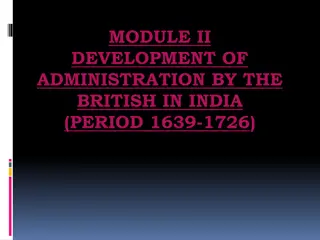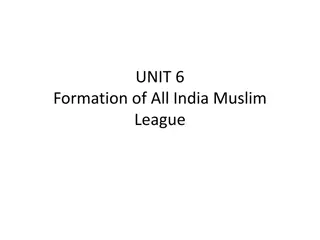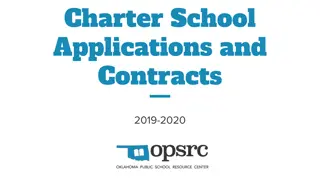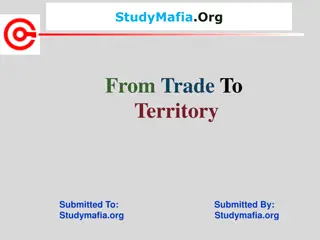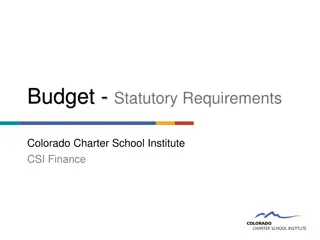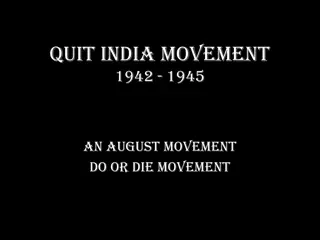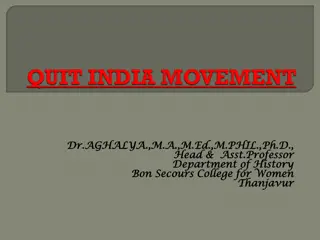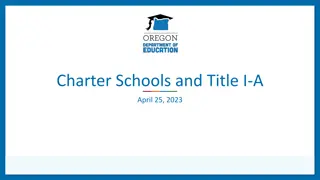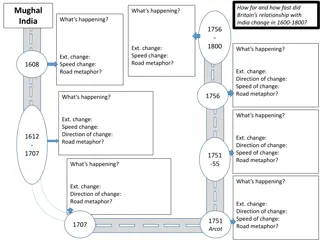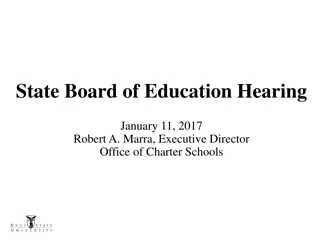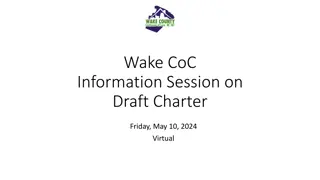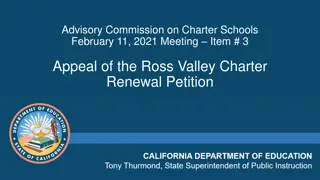British Educational Initiatives in India: Charter Act of 1813
In 1813, the Charter Act marked a significant shift in British education policies in India. It mandated the East India Company to fund Indian education and allowed Christian missionaries to engage in educational activities. The Act allocated funds for promoting literature, science, and native scholars. This pivotal moment laid the foundation for modern education in India.
Download Presentation

Please find below an Image/Link to download the presentation.
The content on the website is provided AS IS for your information and personal use only. It may not be sold, licensed, or shared on other websites without obtaining consent from the author. Download presentation by click this link. If you encounter any issues during the download, it is possible that the publisher has removed the file from their server.
E N D
Presentation Transcript
Charter Act of 1813: In 1600 AD, the British Merchants had formed the trading company in London and this was known as East India Company . The company obtained permission from the Queen Elizabeth-I to carry on trade and commerce in the eastern countries for a period of fifteen years. Accordingly the company came to Surat and established its trade centre at Surat. After establishing its trade centre at Surat, the company took permission from King Jahangir to extent its trade centers in different parts of the country. Accordingly the king Jahangir also gave them permission. After getting permission the company extended their trade centers in different parts of the country like- Madras, Bombay, Calcuttaand Bihar.
By the end of the 17thcentury, the East India Company assumed more political power and as a result their policy had changed considerably. In 1698, the charter of the Company was renewed by the British parliament and the Missionary Clause was inserted in it. It had directed the company to appoint religious teachers and maintain schools wherever necessary. Accordingly these religious teachers established Charity Schools for the poor and orphan children; and gave them education and being guardian less, they were converted in to Christianity. In this way the Christian missionaries converted Indian people into Christianity.
Charles Grant, a company officer came to India in 1773. After arriving in India, he closely observed the pitiable condition of education of the Indian people. Before going back to England, he wrote an essay entitled Observation and published it in 1797. He described in it about the pitiable condition of Indian people as the utterly immoral and wretched condition of Indian society . When the essay was published, the British parliamentarians were more influenced by it and made them realized that something should be done to improve the pitiable condition of education in the country. This had led to the inclusion of the famous Educational Clause in the Charter act of 1813. Hence, when the charter of the East India Company was renewed in 1813, an Educational Clause was inserted in it in Article 43. This Article 43 of the Charter Act of 1813 states as a sum of not less than one lac of rupees shall be set apart annually by the company and applied for the revival and improvement of literature and the encouragement of learned natives of India and for the introduction and promotion of knowledge of sciences among the inhabitants of British territories of India .
This was the first official document which sanctioned a big amount of money for the cause of Indian education. This Act compelled the East India Company to shoulder the responsibility of providing education to the Indian masses. This Act made the Christian missionaries free to work on education according to their own line. After this Act, education of Indian people was considered as an official responsibility of the company. Thus, it can be said that the Charter Act of 1813 had created a new era of British education in India. In other words, this act has been marked as the turning point in the history of modern education in India.
How the educational clause of the charter act of 1813 led to the act of 1813 laid the foundation of state education beginning of modern education in India?/Why is it regarded that the charter al system in India? Charter Act of 1813 on Indian education is a historic that has decided the future course of its development. It made the beginning of an era of modern education system in the country. All the educational developments in British India had been virtually originated from the provisions of the Act. Its impact may be highlighted with the following: The Charter Act of 1813 indicated a powerful step of the British parliament towards the development of Indian education. The British had realized for the first time that financial assistance was needed from the administration for improvement of education in India. This Act had made clear that taking up of educational responsibility of Indian people by the East India Company was a legal right and responsibility to be performed. This Act made the Christian missionaries which were so long undertaking educational task on behalf of the company free to work on education according to their own line. This Act virtually opened up the way for western knowledge of literature and culture and science to develop in the country. 1. 2. 3. 4. 5.
The above realization of the Charter Act of 1813 had their relative impact on shaping the future pattern of Indian education. The educational provision of the Act (the annual sanction of one lac of rupees) had naturally made the concerned educational authorities in the country more conscious. It had led to the long standing controversy between the Orientalists and Anglicists in regard to aims and objectives of education, medium of instruction, method of imparting education and agency to take charge of education. The controversy had led to the formation of General Committee of Public Instruction by the Governor General in 1823. In 1834, Lord Macaulay was appointed as a chairman of the committee and was entrusted a chairman of the committee and was entrusted with responsibility to settle (end) the dispute.
Macaulay, who was an ardent supporter of western literature and science, had submitted his famous minute to the British government in support of the Anglicists stand. Lord W. Bentinct, the Governor General had accepted the recommendations of the approved it. By approving Macaulay s Minute, he declared educational policy of the British government. The official educational policy had clearly intended to discourage oriental learning encouragement to western literature and science for the development of India. Lord Aukland, the Governor General followed by Bentinct had however slightly modified the government policy. Minute and accordingly and gave impetus/
In the later period, to review educational progress in the country, the British parliament had formed a Select Committee to make an enquiry on educational situation of India. Accordingly the committee came to India and prepared a long report to the British parliament. On the basis of the committee s report, an official Dispatch or message was sent to the company in India on 19thJuly, 1854. Sir Charles Wood was appointed as the president of the Board of Control for India. He took the major responsibility of sending the Dispatch. So the Dispatch is known as Wood s dispatch of 1854. It had virtually aimed at modernization of Indian education in the line of the British system.
Accordingly a net work of educational administration in the provinces had been designed under the DPIs and the inspecting officers to help them. Provision was made by the government for training of the teachers, giving grant-in-aid to the educational institutions on the basis of secularism. Three universities namely Calcutta, Bombay and Madras University were set up in 1857 in the pattern of London University. These universities positively helped in the modernization of Indian society. Many educational institutions of the country were also made upgraded by the government. All these developments in the field of Indian education show that the Charter Act of 1813 had led to the beginning of reorganization and modernization of Indian education in the line of British system. Since then, a new era of educational administration and development was started throughout the country. Thus, the Charter Act of 1813 is said to be the foundation state of modern education system in the country.
Anglicists-Classicists Controversy The educational provision of the Charter Act of 1813 had naturally made the Indian people more conscious of their education and culture. At that time there were different agencies undertaking educational responsibilities in India. These include the Christian missionaries, the Classical groups of Pundits and Maulabies, the oriental party of Englishmen supporting the cause of classical languages like Sanskrit, Arabic and Persian and the Anglicists party supporting education. They all came forward to work on their own behalf. the cause of English
According to Charter Act of 1813, the East India Company was compelled to shoulder the educational responsibility of the Indian masses. At that time, there was no Education Department under the East India Company to decide educational grant of the Charter Act of 1813. So, in 1823, the Governor General in Council appointed a General Committee of Public Instruction for Bengal presidency and the grant of one lac of rupees provided by the Charter Act of 1813 was placed at the disposal of the committee. This committee was consisted of Europeans. But the Charter Act of 1813 did not state clearly about the objectives of Indian education or about the medium of instruction to be adopted or about the agency to undertake the charge of education. It simply said as a sum of not less than one lac of rupees shall be set apart annually by the company and applied for the revival and improvement of literature and the encouragement of learned natives of India and for the introduction and promotion of knowledge of sciences among the inhabitants of British territories of India . ten members as
So when the committee was formed out of ten members, five members were in favor of giving education through Indian classical languages and they were known as orientalists/ classicists. They were H.T. Prencep, Lord Minto, warent Hestings and H.H. Wilson. H.T. Prencep was the leader of the oriental party. According to them, education should be provided to the Indian masses through the Classical languages i.e. Sanskrit, Arabic and Persian. According to them, Indian literature and culture should be developed through these languages. On the other hand, the remaining five members were infavour of providing education to the Indian people through the English language and they were known as the Anglicists. They were the young Englishmen who were proud of their political and cultural superiority over the Indian languages, literature and culture. According to them, western knowledge should be acquired by the Indians. So, education should be provided through the English language. Lord Macaulay, the president of the committee was the chief supporter of English language and literature. Between these two groups of the General Committee of Public Instruction, a controversy was stated and lasted for twenty years. This controversy is known as the famous Anglicists-Classicists controversy in the history of Indian education. The main reasons/issues of the controversy were:
Aim of education: According to oriental party, education should aim to preserve and spread the oriental literature and culture among the masses. They were of the opinion that it should be the duty of the British Govt. to improve the oriental literature and culture for Indian people. On the other hand, according English party education should aim to introduce and spread western literature and science among the Indian people. They were of the opinion that Indian people should require western knowledge of literature and science. Medium of Instruction: In regard to medium of instruction, the oriental party was of the opinion that education should be imparted through the medium of classical languages namely Sanskrit, Arabic and Persian. On the other hand, the English party was of the view that education should be imparted through the medium of English. To them, western literature and culture should be spread all over the country through the medium of English languages. Method to be adopted for the spread of education: Regarding method to be adopted, English party argued that education always filters down from upper classes of society to the masses. So, the company should take responsibility to educate the upper classes of society to spread education to the masses. The filtering down of education from the upper classes of society to the masses is called Downward Filtration Theory . On the other hand oriental party was of the opinion that the company should make direct attempt to educate the masses. In other words, the common people should acquire education directly from the East India Company itself. 1. 2. 3.
4. Agency to take charge of Indian education: Regarding agency to take charge of education, the English party was of the view that the Christian missionaries should establish and conduct schools. Whereas some of them suggested to establish schools by the company itself. On the other hand, Oriental party was of the view that the Indian themselves should establish and conduct schools where necessary. According to them, responsibility of education should be given to the Indian people and local schools should be reformed to the changing needs. 5. The terms Literature and Learned natives of India/Indian Scholar : The Charter Act of 1813 did not state clearly about the meaning of the terms Literature and Learned natives of India . A question arose between the two groups of the General Committee of Public Instruction whether literature means the English/western literature or oriental literature and learned natives of India means Indian scholar of western philosophy or Indian scholar of oriental philosophy.
Lord Macaulays Role to end the Controversy: The long standing controversy that had been created by the Charter Act of 1813 was at last decided by Lord Macaulay. He was a great scholar and a writer of English literature. When he arrived in India, the controversy was at its peak. He was appointed as a law member of the Executive council of Governor General in the year 1834 on 13thJune. At the same time, he was also appointed as the chairman of the General Committee of Public Instruction for Bengal Presidency by Lord William Bentinck, the then Governor General in India. The Governor General gave him (Macaulay) charge to decide the controversy. So, he prepared a famous Minute and submitted it to the Governor General Lord W. Bentinck on 2ndFebruary, 1835for which the Minute is also known as Macaulay s Minute. In this Minute, he supported western education through English medium in India by pointing out some important salient points:-
Meaning of the term Literature: As mentioned in the Charter Act of 1813, the term literature means the English literature and not the oriental literature i.e. Sanskrit, Arabic and Persian literature. Learned natives of India or India Scholar: As used in the Charter Act of 1813, Indian scholar means a scholar who is learned in Locke s philosophy and Milton s poetry i.e. English literature. Hence Indian people should gain thorough knowledge of English literature and philosophy. Repudiation (Rejection) of oriental learning Institutions: Lord Macaulay was opposed to the development of oriental learning and pleaded for putting a stop to the oriental learning institutions. He said that these institutions did not serve any useful purpose. He suggested that the government should not incur/ provide heavy expenditure on the publication of oriental literature. Oriental learning institutions should be closed forthwith/ immediately. The fund released by the govt. for oriental literature should now be used for promotion of English literature alone. 1. 2. 3.
4. Proposal for preparing Indian law books into English: Macaulay was not in favor of the study of the Hindu and Islamic law through Sanskrit, Arabic and Persian. He had proposed to get all law books of Sanskrit, Arabic and Persian translated into English. So, he suggested the British Govt. to codify Hindu and Muslim laws in English. 5. Method of imparting Education: On the question of how to give education to the Indian people, Macaulay had pleaded for the method of Downward Filtration Theory . According to this theory, education should filter down from the top to the bottom i.e. from upper classes of society to the masses as the drops of water come down from the Himalayas and pouring into the great Indian Ocean. The English knowing upper classes of Indian people should be given education so that they may in turn go to educate the mass people of the country.
6. Advocating English as the medium of instruction: Macaulay criticized oriental literature and culture. He was of the view that Indian languages are mostly incomplete, inefficient and lack of scientific vocabulary. He cracked many malicious jokes on Sanskrit literature which proved his ignorance of it. Criticizing oriental languages, he advocated English as the medium of instruction. He gave the following arguments in favor of advocating English as the medium of Instruction: English is the language of the rulers and highly Indians were using it. It is the language of the trade and commerce in the eastern countries. Highly Indians themselves are in favor of English rather than classical languages. The progressive Europeans of Africa and Australia also use English and their relation with India is increasing day to day. The students of oriental learning institutions want financial assistance, whereas the students of English schools are ready to pay fees. Indian people might be made learned in English literature and it should be the duty of the Government to make efforts of it.
Bentincks Educational Policy in ending the controversy: Macaulay s Minute had greatly influenced the mind of Lord W. Bentinck. Bentinck himself was an admirer of English education. Thus, he gave his approval to the famous minute made by Macaulay. An official declaration was made on 7th March, 1835. This official declaration of his educational policy was consisted the following resolutions: His Lordship-in-Council is of the opinion that the great object of the British govt. ought to be the promotion of European literature and Science among the natives of India; and thus, all the funds appropriated for the purpose of education would be best employed on English education alone. In other words, the British Government should promote European literature and science among the natives of India. All the funds fixed for the purpose of education should be employed on English education alone. 1.
2. But it is not the intention of His Lordship-in-Council to abolish any college or school of native learning, but no stipend shall be given to any student that may thereafter enter any of these institutions, and when any professor of oriental learning shall vacate his situation, the committee shall report to the Government the number and state of the class in order that the government may be able to decide upon the expediency of appointing a successor . In other words, the oriental learning institutions will not be closed and their students and teachers shall continue to receive their pay and scholarships as usual, but no stipend shall be given to any student that may thereafter enter any of these institutions. 3. It has come to the knowledge of the Governor General-in- Council a large sum has been expanded by the committee on the printing of oriental works; His Lordship-in-Council directs that no portion of the funds shall hereafter be so employed . In other words, after his declaration any money shall be spent for the publication of oriental literature.
4. His Lordship-in-Council directs that all the funds which these reforms will leave at the disposal of the committee be henceforth employed in imparting to the native population a knowledge of English literature and science through the medium of the English language and his lordship-in-Council request the committee to submit to Government with all expedition, a plan for the accomplishment of this purpose. In other words, the money saved will be spent for imparting the knowledge of English literature and science through the medium of the English language. the appointment of teachers should be the responsibility of the Government and thus, he (Bentinck) requested the school committees to inform/ submit the lying vacant without any delay. It was also mentioned that
By declaring his educational policy, Lord William Bentinct brought to an end the famous Anglicists-Classicists Controversy which was stated and lasted for 20 years. This can be termed as the first declaration of the Government of India in the field of education which determined the aims, methods and medium of education in the country. Lord W. Bentinck himself was an admirer of English education and thus, by getting Macaulay s Minute, he got opportunity to enforce his thoughts. He easily accepted and approved Macaulay s Minute and declared his educational policy which helped to bring an end of the controversy.







